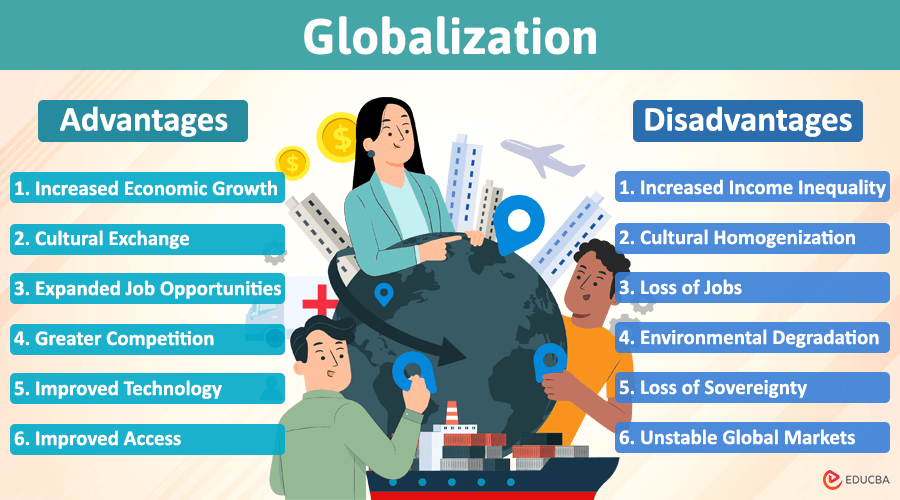Globalization
Globalization is the increasing connection and interdependence of the world’s economies, societies, and cultures, driven by technological advances, communication, and transportation. This process facilitates by reducing trade barriers, increasing the flow of capital, goods, and people across borders, and the growth of multinational corporations. Globalization has positive and negative effects, including increased economic development and cultural exchange, as well as rising income inequality and cultural homogenization. This article WILL emphasize the advantages and disadvantages of globalization in detail.
Top 6 Advantages of Globalization
Below are the top six advantages of globalization:
#1 Increased Economic Growth
Globalization has allowed countries to specialize in producing goods and services in which they have a comparative advantage. This further results in increasing efficiency and boosting economic growth. Cross-border trade and investment have facilitated the flow of goods, services, and capital, creating new markets and thus leading to economic growth.
#2 Cultural Exchange
The increase in travel, communication, and trade has brought people and nations closer together, leading to the sharing of cultures, customs, and ideas. This has led to a greater understanding and appreciation of different cultures. It has also led to better opportunities in the education and research sector.
#3 Expanded Job Opportunities
Globalization has created job opportunities in the markets. It provides access to a vast pool of skilled workers. This has been particularly beneficial for developing countries, which have attracted investment from multinational corporations, creating new jobs and boosting economic growth.
#4 Greater Competition
Increased cross-border trade and investment have led to greater competition in goods and labor markets. Moreover, due to global competition, companies get pressure to improve the quality of their goods, reduce costs, and innovate their products to maintain their market share. Consumers also benefit from the wide range of choices and reduced prices.
#5 Improved Technology
The flow of knowledge and innovations between countries facilitated by globalization has led to more rapid technological advancement. This has led to the development of new products, processes, and services. It has also facilitated the transfer of best practices, increasing efficiency and economic growth.
#6 Improved Access to Goods And Services
Globalization has increased the availability of goods and services, allowing consumers to choose from a broader range of products at competitive prices. This has led to increased consumer choice and improved living standards for many people.
Top 6 Disadvantages of Globalization
There are both advantages and disadvantages to globalization. Some of the disadvantages of globalization are:
#1 Increased Income Inequality
Globalization has resulted in the widening gap between the rich and the poor, both within the country and globally. Increased income inequality has been due to the shift of jobs to countries with lower labor costs and the concentration of wealth in the hands of a few multinational corporations.
#2 Cultural Homogenization
Globalization has resulted in the spread of social elements such as Hollywood movies and fast food franchises which has led to the erosion of traditional traditions and values. This has been particularly evident in developing countries, where the cultural exchange has been one-sided, with their own cultures replaced by western culture.
#3 Loss of Jobs
Globalization has led to unemployment in developed countries as companies relocate to countries with lower labor costs. This has been particularly problematic for unskilled workers who do not have the desired skills required for the new jobs.
#4 Environmental Degradation
Environmental Degradation refers to the decline in the quality of the natural environment due to human activities. This includes air and water pollution, soil erosion, deforestation, loss of biodiversity, and climate change. These environmental problems arise from the increased production and consumption of goods and services, transportation, and urbanization associated with globalization. They lead to long-term ecological damage and threaten the well-being of both present and future generations.
#5 Loss of Sovereignty
Globalization has led to the transfer of decision-making power from national governments to multinational corporations and international institutions. This has also resulted in the loss of sovereignty for many countries, as several external entities make decisions. This affects the citizens of the host country. Such loss of power has also led to a lack of democratic control over economic and social policies.
#6 Unstable Global Markets
Due to the interlink of global markets, external downturns in one region can greatly impact other regions. This has led to greater financial instability and increased risks for investors and consumers. For example, the 2008 global financial crisis was primarily caused by the collapse of the housing market in the United States, which had far-reaching effects on economies worldwide.
Final Thoughts
In conclusion, globalization has proven to be a double-edged sword, with pros and cons affecting economies, societies, and individuals worldwide. As we move forward, it is crucial to weigh the advantages and disadvantages of globalization and strive toward finding a balance between economic progress and social and environmental sustainability. By recognizing and tackling the drawbacks of globalization, a future in which everyone shares the benefits of globalization is achievable, and the world may thrive together.
Recommended Articles
We hope that this EDUCBA information on “Advantages and Disadvantages of Globalization ” was beneficial to you. You can view EDUCBA’s recommended articles for more information,

